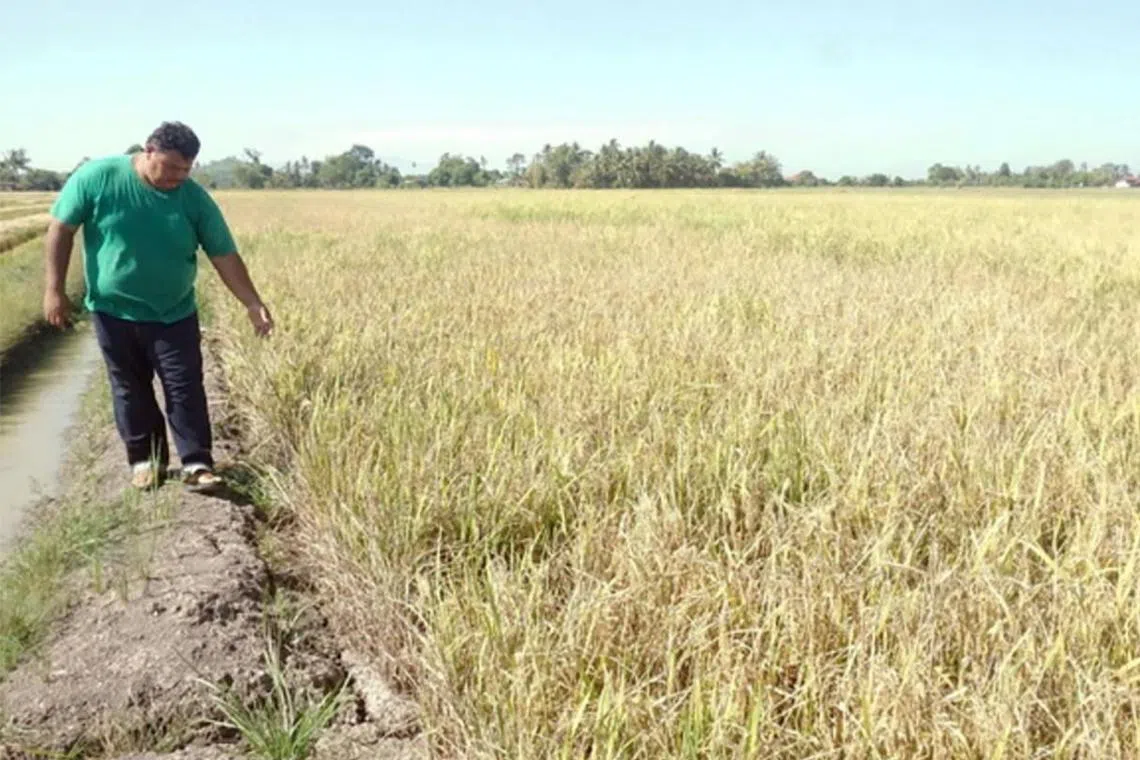Padi farmers in Malaysia losing half their income due to hot spell
Sign up now: Get insights on the biggest stories in Malaysia

The Malaysian Meteorological Department issued a heatwave warning for several areas such as Padang Terap and Kota Setar.
PHOTO: BERNAMA
KEDAH – Padi farmers in Kedah are experiencing lower production yield
Padi farmer Wan Maharuddin Sulaiman, 67, said the current hot weather had badly affected crops.
“Other factors which contributed to the lower production were rare diseases,” he added.
Mr Wan Maharuddin, who has been a padi farmer for 20 years, said most farmers in the Pokok Sena and Muda Agricultural Development Authority (Mada) areas are now in the midst of harvesting their crops.
He said some have even finished harvesting and are awaiting further instructions from Mada on the new padi planting season.
“While waiting for the new planting season, we’re using the time to repair the fields. This is also the time (for us) to fix patches or holes in the fields,” he added.
Another farmer, Mr Abdul Rahman Musa, 70, said padi farmers in Pendang were taking on other jobs to earn an income during the hot spell.
“While waiting for the new season, some of us do ‘kampung jobs’ such as gardening or helping at the ‘nat’ (morning market),” he said.
“Older farmers like me spend time at home with our families and go to the surau to perform prayers and listen to sermons.”
Mr Abdul Rahman said the weather in Pendang now is scorching and farmers are trying to minimise their outdoor activities.
The Malaysian Meteorological Department (MetMalaysia) issued a heatwave warning
The weather forecast for Kedah had indicated two weeks of sunny days, with sporadic rainfall and storms, starting on March 17.
A check on the MetMalaysia website found that the temperature in Kedah will be between 35 deg C and 37 deg C over the next few days.
Meanwhile, Mada said the water levels at the three water dams under its supervision were enough to meet the irrigation requirements for padi farming activities and household usage throughout the El Nino season, which is typically associated with droughts and heatwaves.
As at March 17, the total combined capacity of the three dams was at a stable level of 72.6 per cent.
“The storage capacity at Pedu, Muda and Ahning dams show comfortable levels at 71.43 per cent, 47 per cent and 91.56 per cent respectively,” it said in a statement.
The current status of padi cultivation activities in Mada areas indicates that 77.3 per cent of the crops have already been harvested.
The use of water for irrigation is thus at a minimum level, Mada said.
It also said the total rainfall recorded in areas under its purview up to March 16 was a lower reading of 59mm, compared with the 20-year average rainfall of 164mm.
Mada, however, said the public need not worry, adding that though the water levels in the dams had decreased slightly, they were still sufficient for the next padi cultivation season that will begin in April.
Mada also said that in anticipation of the ongoing El Nino phenomenon, which is expected to continue until June, it will continue to take precautionary measures and immediate actions by maximising the use of recycling pump stations to conserve water from the dams.
“Farmers are advised to manage water usage efficiently to ensure that the water supply can be distributed effectively and to avoid wastage,” it added. THE STAR/ASIA NEWS NETWORK


